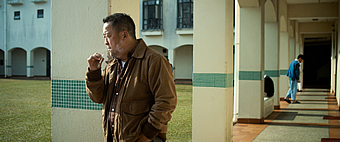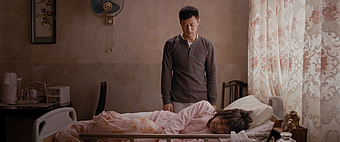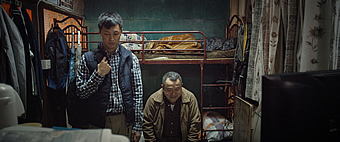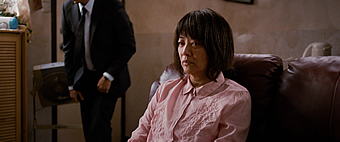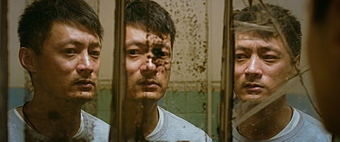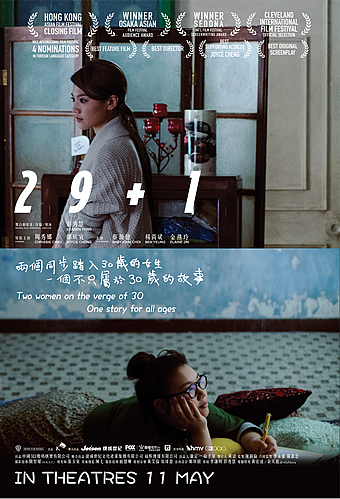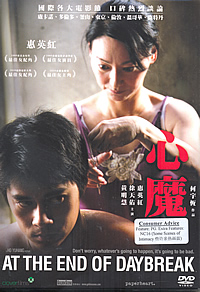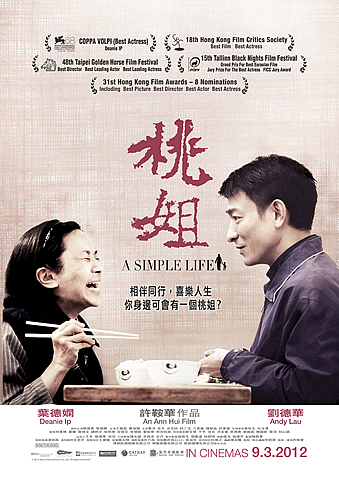MAD WORLD (一念无名) (2017)
Genre: Drama
Director: Wong Chun
Cast: Shawn Yue, Eric Tsang, Elaine Jin, Charmaine Fong
Runtime: 1 hr 41 mins
Rating: PG13
Released By: MM2 Entertainment, Golden Village Pictures
Official Website:
Opening Day: 22 June 2017
Synopsis: “To avoid, or to confront? To deny, or to embrace? To give up, or to make a change?” The film begins with an old man who has long been absent as a father (Eric TSANG), picking up his son (Shawn YUE), who is suffering from bipolar disorder, from a mental hospital. Both men are in deep remorse for the accident that caused the death of the mother (Elaine JIN). The tension and anxiety boil as they stay with each other in a tiny subdivided flat. As time passes, they realize the pain between one another is not the only confrontation that awaits them; but also to face the cruel and unjust world that they are living in.
Movie Review:
“And now here is my secret, a very simple secret: It is only with the heart that one can see rightly; what is essential is invisible to the eye.” ― Antoine de Saint-Exupéry, The Little Prince
‘Mad World’ is not an easy film to watch, but it is well worth the discomfiting experience. Not quite enough attention has been paid to the plight of mental health patients who try to re-integrate into the community, and certainly too little attention has been placed on the frustration and even exasperation of their caregivers. While the former often find their best attempts thwarted by the fears, biases and outright discrimination of general society, the latter has to contend not only with the same but also the outbursts of their loved ones struggling to overcome their condition, so much so that many often end up in burnout.
Both perspectives are vividly portrayed in director Paul Chun’s feature debut, which follows Tung’s (Shawn Yue) acclimatisation to the outside world after spending a year in a mental hospital for bipolar disorder. Seeing little more that institutionalisation can do for Tung, the hospital contacts his estranged father Wong (Eric Tsang) to look after him, but the latter is frankly completely ill-prepared. A cross-border truck driver who was often absent from home, Wong had pretty much abandoned his mentally disturbed wife (Elaine Jin) and Tung years ago, which Tung inevitably still begrudges him for; after all, that had led to Tung needing to quit his job to take care of her when she became bedridden, and that stress of being the only caregiver, aggravated by her verbally abusive ways, had ultimately led to her accidental death one day and his subsequent admission into psychiatric care.
There is plenty in the past that Tung needs to come to terms with on his own, and equally just as much in the present. His friends had deserted him ever since the much-publicised incident a year earlier, and his surprise appearance at a former colleague’s wedding soon after his discharge shows how ignorant and bigoted they can be. He wants to make things right with his former fiancée Jenny (Charmaine Fong), who had to repay not just the flat they had bought together but also the moneylenders Tung owed because of a huge loan he took out to finance some risky investments that eventually went south. It doesn’t help that social media has fuelled a gallery of judgmental jury, who seize on his unfortunately public meltdown after hearing Jenny’s emotive confession of her ordeal to question his mental state and weigh if he should be sent back to hospital after all.
Oh yes, the title could refer to Tung’s own mind as much as it could of the external environment he has to navigate – and Wong takes swipes at everything from our prejudice against the mentally ill, to the terrible living conditions of Hong Kong’s lower-class, and even to the spate of ‘banker’ suicides in the financial district back in 2014/15. It is to his credit as well as that of screenwriter Florence Chan that their movie never feels the need to scream at or, for the lack of a better word, get mad at these social ills; rather, both display remarkable restraint at simply keeping it authentic, letting their audience make their own discernments rather than lay out the critique for us.
In fact, ‘Mad World’ is much better off by simply remaining at its heart a frank and intimate portrait of Tung’s struggle to get back on his feet, anchored by the initially tense but ultimately tender father-son relationship between Tung and Wong. Like we said at the beginning, the struggle is as much Tung’s as it is Wong’s. Through the course of the movie, Wong has to seriously evaluate if he has the means and wherewithal to care for Tung, especially given how little support he has from his family (his eldest son, or Tung’s older brother, has resettled in the United States, staying conspicuously absent and callously disengaged throughout), friends and fellow tenants – and let’s just say it says a lot when another caregiver at a carer support programme Wong enrols himself in advises him to consider re-admitting Tung back into hospital under the false pretence that the latter is suicidal.
Though more commonly known for his comedic roles, Eric Tsang is in top form here as Wong. In perfectly low-key fashion, Tsang lays bare his character’s uncertainties and anxieties at the beginning when asked to look after Tung, subsequent guilt and pain when forced to confront the sins of his past, and eventually resolve to not ‘outsource’ his responsibilities as a father. Tsang doesn’t overplay or overstate Wong’s dilemmas, allowing his audience to make sense of his character on their own terms. For that matter, so does Yue, who eschews histrionics in his portrayal of Tung’s manic/ depressive state. Proving his mettle as one of the most underrated actors of his generation, Yue gives a layered, nuanced performance that earns empathy without ever playing the ‘pity’ card. Most of the time, Yue and Tsang also exude a gentle but unmistakable familial warmth; though in the singular scene where they go head to head with each other’s grievances, both actors bring heartfelt poignancy as two individuals trying to make the best of their respective circumstances but whose actions and decisions are inextricably bound to each other.
Aside from the fact that Tung’s journey to reintegrate back into the community is not an easy one, ‘Mad World’ is also not an easy fact simply because there are no easy solutions to the issues faced by people like Tung. At the individual level, it isn’t easy for the caregiver, as Wong’s own experience here shows. At the community level, it isn’t easy for neighbours, friends and even relatives to put aside their fears or biases. And at the societal level, it isn’t easy to change mindsets borne out of ignorance or worse convenience. But like the quote which bookends the movie, it starts with having a heart for these individuals we often shun, so that however idealistic it may sound, the world may be a little less crazy for them and for us.
Movie Rating:




(Anchored by career-best performances from Shawn Yue and Eric Tsang, ‘Mad World’ is an honest, sincere and at times discomfiting portrait of mental illness that is deeply meaningful and genuinely moving)
Review by Gabriel Chong
You might also like:
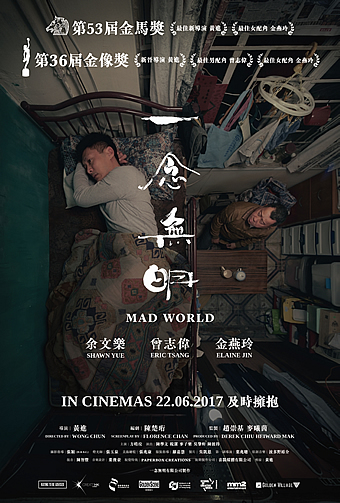
Movie Stills
